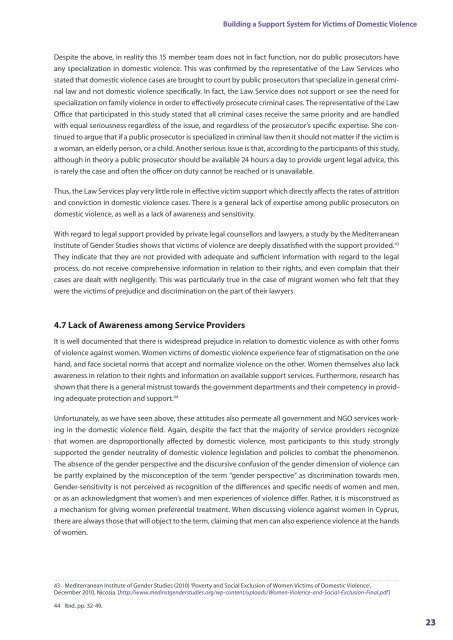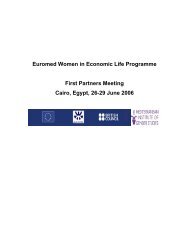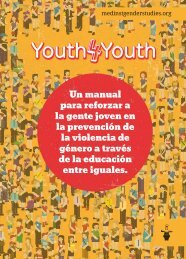react to domestic violence
react to domestic violence
react to domestic violence
Create successful ePaper yourself
Turn your PDF publications into a flip-book with our unique Google optimized e-Paper software.
Building a Support System for Victims of Domestic Violence<br />
Despite the above, in reality this 15 member team does not in fact function, nor do public prosecu<strong>to</strong>rs have<br />
any specialization in <strong>domestic</strong> <strong>violence</strong>. This was confirmed by the representative of the Law Services who<br />
stated that <strong>domestic</strong> <strong>violence</strong> cases are brought <strong>to</strong> court by public prosecu<strong>to</strong>rs that specialize in general criminal<br />
law and not <strong>domestic</strong> <strong>violence</strong> specifically. In fact, the Law Service does not support or see the need for<br />
specialization on family <strong>violence</strong> in order <strong>to</strong> effectively prosecute criminal cases. The representative of the Law<br />
Office that participated in this study stated that all criminal cases receive the same priority and are handled<br />
with equal seriousness regardless of the issue, and regardless of the prosecu<strong>to</strong>r’s specific expertise. She continued<br />
<strong>to</strong> argue that if a public prosecu<strong>to</strong>r is specialized in criminal law then it should not matter if the victim is<br />
a woman, an elderly person, or a child. Another serious issue is that, according <strong>to</strong> the participants of this study,<br />
although in theory a public prosecu<strong>to</strong>r should be available 24 hours a day <strong>to</strong> provide urgent legal advice, this<br />
is rarely the case and often the officer on duty cannot be reached or is unavailable.<br />
Thus, the Law Services play very little role in effective victim support which directly affects the rates of attrition<br />
and conviction in <strong>domestic</strong> <strong>violence</strong> cases. There is a general lack of expertise among public prosecu<strong>to</strong>rs on<br />
<strong>domestic</strong> <strong>violence</strong>, as well as a lack of awareness and sensitivity.<br />
With regard <strong>to</strong> legal support provided by private legal counsellors and lawyers, a study by the Mediterranean<br />
Institute of Gender Studies shows that victims of <strong>violence</strong> are deeply dissatisfied with the support provided. 43<br />
They indicate that they are not provided with adequate and sufficient information with regard <strong>to</strong> the legal<br />
process, do not receive comprehensive information in relation <strong>to</strong> their rights, and even complain that their<br />
cases are dealt with negligently. This was particularly true in the case of migrant women who felt that they<br />
were the victims of prejudice and discrimination on the part of their lawyers.<br />
4.7 Lack of Awareness among Service Providers<br />
It is well documented that there is widespread prejudice in relation <strong>to</strong> <strong>domestic</strong> <strong>violence</strong> as with other forms<br />
of <strong>violence</strong> against women. Women victims of <strong>domestic</strong> <strong>violence</strong> experience fear of stigmatisation on the one<br />
hand, and face societal norms that accept and normalize <strong>violence</strong> on the other. Women themselves also lack<br />
awareness in relation <strong>to</strong> their rights and information on available support services. Furthermore, research has<br />
shown that there is a general mistrust <strong>to</strong>wards the government departments and their competency in providing<br />
adequate protection and support. 44<br />
Unfortunately, as we have seen above, these attitudes also permeate all government and NGO services working<br />
in the <strong>domestic</strong> <strong>violence</strong> field. Again, despite the fact that the majority of service providers recognize<br />
that women are disproportionally affected by <strong>domestic</strong> <strong>violence</strong>, most participants <strong>to</strong> this study strongly<br />
supported the gender neutrality of <strong>domestic</strong> <strong>violence</strong> legislation and policies <strong>to</strong> combat the phenomenon.<br />
The absence of the gender perspective and the discursive confusion of the gender dimension of <strong>violence</strong> can<br />
be partly explained by the misconception of the term “gender perspective” as discrimination <strong>to</strong>wards men.<br />
Gender-sensitivity is not perceived as recognition of the differences and specific needs of women and men,<br />
or as an acknowledgment that women’s and men experiences of <strong>violence</strong> differ. Rather, it is misconstrued as<br />
a mechanism for giving women preferential treatment. When discussing <strong>violence</strong> against women in Cyprus,<br />
there are always those that will object <strong>to</strong> the term, claiming that men can also experience <strong>violence</strong> at the hands<br />
of women.<br />
43 Mediterranean Institute of Gender Studies (2010) ‘Poverty and Social Exclusion of Women Victims of Domestic Violence’,<br />
December 2010, Nicosia. [http://www.medinstgenderstudies.org/wp-content/uploads/Women-Violence-and-Social-Exclusion-Final.pdf]<br />
44 Ibid. pp. 32-49.<br />
23







